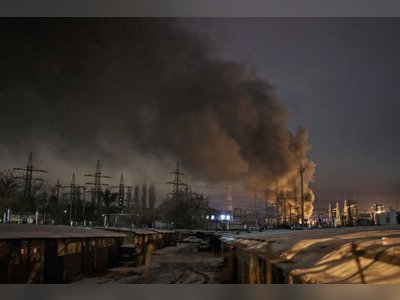Italian Government Revives Strait of Messina Bridge Project with NATO Defense Strategy
Prime Minister Giorgia Meloni aims to validate the €13 billion infrastructure project as a critical NATO corridor amid environmental concerns and geological challenges.
ROME – Italian Prime Minister Giorgia Meloni is advocating for the rebranding of the long-anticipated €13 billion Strait of Messina Bridge as a strategic NATO corridor, seeking to overcome historical hurdles in order to secure both political and financial support from the European Commission.
The concept of a bridge connecting mainland Italy to Sicily, spanning approximately three kilometers, dates back to ancient Rome.
Although formal project proposals surfaced in the 1970s, the bridge has long been emblematic of unfinished high-profile infrastructure endeavors in Italy, marred by financial, environmental, and earthquake-related concerns over the years.
In a renewed effort to render the project viable, Meloni's administration has proposed including the bridge in the EU's Military Mobility Action Plan.
This plan allocates funding for transport corridors that facilitate rapid military deployment across the Union.
In an April correspondence to the European Commission, the Italian government contended that the bridge would enhance Europe’s defensive capabilities by enabling the swift movement of troops from Northern Europe to Sicily’s military installations.
This new classification could potentially unlock supplementary EU funding and allow Italy to categorize the project as part of its defense expenditures, coinciding with discussions among NATO allies about a new defense spending target.
However, the viability of rebranding the project as a military asset raises questions about its environmental implications.
The bridge's construction would intersect three Natura 2000 areas, designated for their ecological significance, which includes crucial marine habitats and migratory bird pathways.
EU regulations impose stringent requirements for projects impacting protected areas, necessitating prior approval from the European Commission.
In response, the Italian government has indicated a desire to classify the bridge as a project of “overriding public interest,” which would provide a pathway to seek exemptions from existing environmental regulations.
A spokesperson for the European Commission has emphasized that such a designation would need to fulfill several criteria, proving necessity, lack of alternatives, and provisions for compensatory environmental measures.
The state-owned company appointed to manage the project, Stretto di Messina, has stated its confidence that all environmental assessments required by Italy's regulatory bodies have been meticulously completed, with plans to submit final documentation by May. If approved by the Commission, this could eliminate the last bureaucratic barriers and initiate construction efforts.
Geological conditions present another formidable challenge for the bridge's construction.
The Strait of Messina is situated in a region noted for its seismic activity, having experienced one of the deadliest earthquakes in European history in 1908, resulting in approximately 80,000 fatalities.
The managing company asserts that the bridge is designed to withstand significant seismic events, with foundational points strategically located to avoid seismic fault lines.
However, concerns persist among independent geological experts.
Geologists have expressed skepticism regarding the complexities of the local geology, suggesting that long-term safety cannot be assured without further comprehensive studies.
The National Institute of Geophysics and Volcanology of Italy has called for more rigorous analyses and emphasized the need for enhanced safety parameters, particularly in light of the over 6,000 earthquakes recorded in the area since 1908.
Moreover, the strategic military importance of the bridge remains contentious.
Some defense analysts have questioned the necessity of a direct link to Sicily in the broader context of NATO defense strategies, especially against potential threats from Russia.
They suggest that deploying troops and military equipment from Adriatic ports in Italy to neighboring countries may be more efficient for protecting NATO's eastern flank.
While Sicilian military bases hold significance, their importance is principally associated with air operations and intelligence capabilities, rather than large-scale troop movements.
Experts argue that it may be more operationally logical to position rapid deployment forces closer to the northern Alpine passes, rather than in Sicily.
The future of the Strait of Messina Bridge project hangs in a delicate balance, influenced by its restructured defense rationale, persistent environmental and geological concerns, and its debated military utility.
The concept of a bridge connecting mainland Italy to Sicily, spanning approximately three kilometers, dates back to ancient Rome.
Although formal project proposals surfaced in the 1970s, the bridge has long been emblematic of unfinished high-profile infrastructure endeavors in Italy, marred by financial, environmental, and earthquake-related concerns over the years.
In a renewed effort to render the project viable, Meloni's administration has proposed including the bridge in the EU's Military Mobility Action Plan.
This plan allocates funding for transport corridors that facilitate rapid military deployment across the Union.
In an April correspondence to the European Commission, the Italian government contended that the bridge would enhance Europe’s defensive capabilities by enabling the swift movement of troops from Northern Europe to Sicily’s military installations.
This new classification could potentially unlock supplementary EU funding and allow Italy to categorize the project as part of its defense expenditures, coinciding with discussions among NATO allies about a new defense spending target.
However, the viability of rebranding the project as a military asset raises questions about its environmental implications.
The bridge's construction would intersect three Natura 2000 areas, designated for their ecological significance, which includes crucial marine habitats and migratory bird pathways.
EU regulations impose stringent requirements for projects impacting protected areas, necessitating prior approval from the European Commission.
In response, the Italian government has indicated a desire to classify the bridge as a project of “overriding public interest,” which would provide a pathway to seek exemptions from existing environmental regulations.
A spokesperson for the European Commission has emphasized that such a designation would need to fulfill several criteria, proving necessity, lack of alternatives, and provisions for compensatory environmental measures.
The state-owned company appointed to manage the project, Stretto di Messina, has stated its confidence that all environmental assessments required by Italy's regulatory bodies have been meticulously completed, with plans to submit final documentation by May. If approved by the Commission, this could eliminate the last bureaucratic barriers and initiate construction efforts.
Geological conditions present another formidable challenge for the bridge's construction.
The Strait of Messina is situated in a region noted for its seismic activity, having experienced one of the deadliest earthquakes in European history in 1908, resulting in approximately 80,000 fatalities.
The managing company asserts that the bridge is designed to withstand significant seismic events, with foundational points strategically located to avoid seismic fault lines.
However, concerns persist among independent geological experts.
Geologists have expressed skepticism regarding the complexities of the local geology, suggesting that long-term safety cannot be assured without further comprehensive studies.
The National Institute of Geophysics and Volcanology of Italy has called for more rigorous analyses and emphasized the need for enhanced safety parameters, particularly in light of the over 6,000 earthquakes recorded in the area since 1908.
Moreover, the strategic military importance of the bridge remains contentious.
Some defense analysts have questioned the necessity of a direct link to Sicily in the broader context of NATO defense strategies, especially against potential threats from Russia.
They suggest that deploying troops and military equipment from Adriatic ports in Italy to neighboring countries may be more efficient for protecting NATO's eastern flank.
While Sicilian military bases hold significance, their importance is principally associated with air operations and intelligence capabilities, rather than large-scale troop movements.
Experts argue that it may be more operationally logical to position rapid deployment forces closer to the northern Alpine passes, rather than in Sicily.
The future of the Strait of Messina Bridge project hangs in a delicate balance, influenced by its restructured defense rationale, persistent environmental and geological concerns, and its debated military utility.
AI Disclaimer: An advanced artificial intelligence (AI) system generated the content of this page on its own. This innovative technology conducts extensive research from a variety of reliable sources, performs rigorous fact-checking and verification, cleans up and balances biased or manipulated content, and presents a minimal factual summary that is just enough yet essential for you to function as an informed and educated citizen. Please keep in mind, however, that this system is an evolving technology, and as a result, the article may contain accidental inaccuracies or errors. We urge you to help us improve our site by reporting any inaccuracies you find using the "Contact Us" link at the bottom of this page. Your helpful feedback helps us improve our system and deliver more precise content. When you find an article of interest here, please look for the full and extensive coverage of this topic in traditional news sources, as they are written by professional journalists that we try to support, not replace. We appreciate your understanding and assistance.











